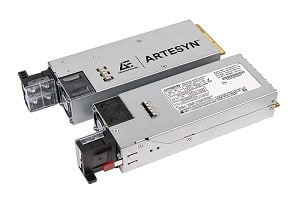Designed to serve a wide range of applications in traditional AC data centres, DC telco central offices and DC data centres
 Advanced Energy has unveiled a new 48-volt DC-input power supply designed for compute, storage and networking applications. The new Artesyn CSU2000ADC-3 joins the company’s market-leading CSU series of AC-DC power conversion solutions and broadens AE’s product portfolio to meet data centre power supply needs for telecommunications, data communications, cloud infrastructure and enterprise IT customers.
Advanced Energy has unveiled a new 48-volt DC-input power supply designed for compute, storage and networking applications. The new Artesyn CSU2000ADC-3 joins the company’s market-leading CSU series of AC-DC power conversion solutions and broadens AE’s product portfolio to meet data centre power supply needs for telecommunications, data communications, cloud infrastructure and enterprise IT customers.
The CSU2000ADC-3 has 48 V input and 12 V output at 2000 W. This new DC-DC power supply is the industry’s only 2 kW carrier-grade power supply, providing unmatched scalability and a path for power capacity flexibility while satisfying unique carrier requirements for input cabling. It features an industry-standard common redundant power supply (CRPS) form factor, making it simple for customers to design into their systems.
Designed to serve a wide range of applications in traditional AC data centres, DC telco central offices, as well as increasingly-common DC data centres, the CSU2000ADC-3 delivers universal usage across these three environments, which reduces customers’ development time, cost and risk.
“Our customers want a one-stop partner for power conversion solutions and this introduction of a 48-volt DC-input power supply is the next important milestone in building our complete CSU series portfolio,” said Brian Korn, vice president and general manager of data centre computing, telecom and network products, Advanced Energy. “Our new CSU2000ADC-3 provides our customers with the predictable performance and future-proof system designs they’ve come to expect from AE.”
The introduction of the CSU2000ADC-3 comes at a time of exponential growth in data computing, storage and networking, fueled by accelerated adoption of cloud computing and Internet usage, as well as growing investments in hyper-scale data centre infrastructure, as the world experiences the 4th industrial revolution. To meet the growing demand, today’s data centres require increased compute density and that in turn requires a higher level of power density, where AE continues to lead the industry.






